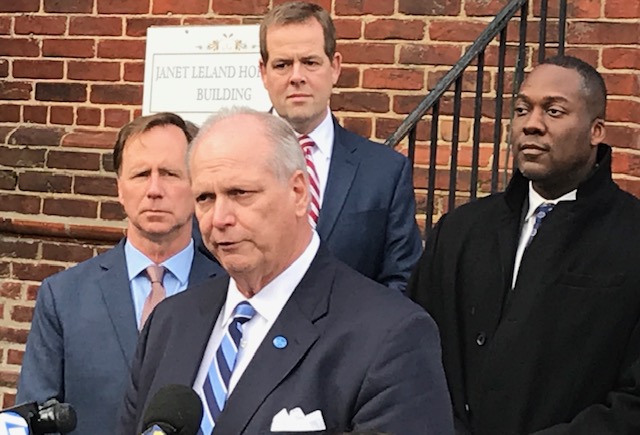@BryanRenbaum
[email protected]
Maryland’s county leaders and city officials convened in Annapolis on Wednesday to urge members of the General Assembly to provide more money to balance transportation spending across the state.
“Transportation planning is not just about moving cars. It’s really about moving people. When we do transit, rather than just investing in roads, what we’re really doing is improving the health of our residents…we’re improving the environment when we get cars off the road and we’re addressing what it costs to live in our county and in our region,” Anne Arundel County Executive Steuart Pittman said at a news conference across the street from the State House.
“The cost of housing has increased far faster than peoples’ incomes. The cost of health insurance, the cost of health care — and we can actually help people out by making it possible for them to get to and from their jobs — to and from the other places they go —with public transit.”
Anne Arundel County’s annual budget includes $75 million for a “permanent public improvements fund” for transportation and some of that money will go to mass transit, he said.
Pittman said local leaders must fight for the state funding their jurisdictions need.
“When we’re talking about state investments we have to put a stake in the ground. There are a lot of competing needs. Education is important. Health is important. There are a lot of competing needs.”
Howard County Executive Calvin Ball stressed his county’s need for expanded transit options.
“Howard County residents have a shared interest in solving our transportation challenges. Traffic and transit is a top concern for our residents…Despite our location between two major metropolitan areas, Baltimore and D.C., the MARC-Camden line is the only all-day long-distance transit service in the county.
“We need both a well-run and adequately funded system if we want to improve the quality of life and opportunities for all of our residents and our businesses. Losing over $2.5 million in state funds in the MDOT (Maryland Department of Transportation) capital program to plan and design capital improvements along the US-29 corridor between Columbia and Montgomery County isn’t the way that we wanted to start this legislative session — but that can change.”
Ball said his county has been a leader in transit innovation.
“We’re making strides within Howard County to create a more multi-modal transportation system by expanding our local transit service, rolling out new transit applications this spring for mobile fare payments and real-time bus information for our RTA [Regional Transportation Agency of Central Maryland].
“We’re adopting a complete streets policy and a brand new pedestrian masterplan to compliment the record investments that we’ve made in our BikeHoward Express.”
He said the county is “working with the public school system to expand transit use” for students and to improve “walking pathways.”
A regional transit plan would benefit Howard County, Ball said.
“Howard County is in full support of creating a regional transit plan to focus on priority corridors, which can range from improving access to city institutions and services for underserved population centers throughout our county, improving the ability for high-tech employers in Columbia and throughout Howard County to compete for those high-skilled workers living outside of our state and in D.C.”
Steve Sharkey, director of the Baltimore Department of Transportation, highlighted the importance of the Maryland Transit Administration to both the city’s and state’s economies.
“The safe and reliable and efficient operation of MTA is critical to both Baltimore City and the state of Maryland’s economy. Data provided by the U.S. Bureau of Labor Statistics indicates that between November 2018 to November 2019 the state of Maryland generated roughly 31,400 new jobs — 23,600 of which … were generated in the Baltimore Metropolitan Area.”
The officials spoke in favor of HB368 and its Senate companion, SB 424. The House held a hearing on the bill last Tuesday. The Senate held a hearing on the bill today starting at 1 p.m. EST.
The legislation would, according to its text, require “the Governor to include certain appropriations in the State budget from the Transportation Trust Fund to the Maryland Transit Administration for the operating and capital needs of the Administration in certain fiscal years; requiring that certain capital appropriations to the Administration be in addition to any funds appropriated for the capital planning, engineering, right-of-way acquisition, or construction of the Purple Line; etc.”
The press conference was sponsored by the Greater Baltimore Committee, a business advocacy organization.
GBC President and CEO Donald Fry said the legislation requests $500 million for the MTA in the next five consolidated transportation plans. Fry said about $370 million is currently allocated.




Recent Comments